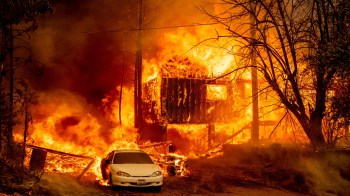Pakistan’s floods will have large-scale economic impact
TEXT OF INTERVIEW
Steve Chiotakis: And now to the global perspective, what’s happening in business and economics around the world and how it affects the United States.
In Pakistan, flood waters continue to flow through the country, which have destroyed buildings and killed more than 1,500 people. The monsoonal flooding is being called the worst in modern Pakistan history, mainly because the high water hit in the country’s agricultural heartland, destroying crops and leaving the country vulnerable to food shortages. Neva Khan is with the aid organization Oxfam and she’s with us on the phone from Islamabad. Neva, thanks for being with us.
Neva Khan: My pleasure.
Chiotakis: What are you seeing on the ground over there?
Khan: We’re seeing over 3 million people who are at the moment affected by floods, and this number is going to go up.
Chiotakis: Obviously the recovery, Neva, is ongoing over there. What are the lasting economic effects these floods will cause?
Khan: I think it’s very hard to say exactly what will be the economic impact, except to say the requirements for the flood-affected areas of Pakistan are going to be expensive. We’re talking about, you know, bridges needing to be rebuilt, we’re talking about people having to have the resources to rebuild their lives. I mean, this is going to be a very large-scale, extremely expensive operation that’s going to take a long time for the country to move forward on.
Chiotakis: What’s the best way to help a country in this situation? I mean, do you just send money?
Khan: I think the best way for everyday people at the moment is anything that they can spare, because I know things are very hard in America at the moment, as well as in Europe and everywhere else. Whatever people can afford to give, I think the people of Pakistan will certainly be very grateful.
Chiotakis: I know, Neva, Pakistan and the United States are already spending so much money, billions of dollars, in the fight against terrorism in those areas. Are these disasters just spreading that regional aid much thinner?
Khan: Certainly, and I mean, you will know that the U.S. government has committed to fight . . . the next five years. However, I was talking with somebody only yesterday, and they were trying to explain to me how they’ve gone through the various problems with the militancy. And they said, “Well you know, Neva, it’s now, this flood has a bigger impact on our lives than anything before. Because now, people have lost their homes.” You know, this is an extensive problem for people and for the government of Pakistan and the humanitarian community.
Chiotakis: Neva Khan with the aid organization Oxfam. Thank you so much for being with us today.
Khan: You’re very welcome.
There’s a lot happening in the world. Through it all, Marketplace is here for you.
You rely on Marketplace to break down the world’s events and tell you how it affects you in a fact-based, approachable way. We rely on your financial support to keep making that possible.
Your donation today powers the independent journalism that you rely on. For just $5/month, you can help sustain Marketplace so we can keep reporting on the things that matter to you.


















